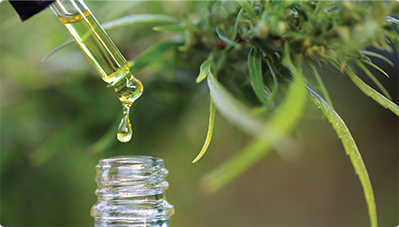
Triple Your Impact This Holiday Season
Triple Your Impact This Holiday Season
Celebrate the holidays with a year-end gift that can go 3x as far to help provide care and support to the millions affected by Alzheimer's disease, and to advance critical research. But please hurry — this 3x Match Challenge ends soon.
Donate Now Researchers call for caution
Researchers call for caution
Cannabis (marijuana) has a long, illicit history in America. Many states began placing restrictions on the drug in the early 1900s, and in 1970, the drug became illegal nationwide.
But the story is evolving. Although cannabis remains illegal on the federal level, medical cannabis is now legal in 33 states and the District of Columbia, and the recreational use of cannabis is permissible in 11 states and our nation’s capital. Fifteen other states have decriminalized the drug, which means possession of small amounts no longer carries jail time.
The availability of cannabis and cannabis-derived products — in natural and synthetic forms, such as oils, lotions, beverages, food and even dog treats — has sparked a lucrative industry, with some companies asserting dubious claims about their health benefits.
More research needed
Currently, there’s a lack of research on the use of cannabis and cannabis-derived products to treat Alzheimer’s and other dementias, and results from the small group of existing studies have been inconclusive.
Alzheimer’s Association Director of Scientific Engagement Rebecca Edelmayer, Ph.D., often fields questions about cannabis and Alzheimer’s. Given the disease’s devastating effects, people are understandably curious to learn if cannabis can offer relief or improve quality of life.
“From a medical perspective, we still don’t understand the benefits and risks of taking cannabis-derived products. If you make the choice to take one, your physician should be involved to assess any potential side effects or interactions with other medications,” Edelmayer says.
Lots of hype, little evidence
Cannabis is a plant that contains more than 80 biologically active chemical compounds. The best-known compounds include cannabidiol (CBD) and delta-9-tetrahydrocannabinol (THC). A number of cannabis-derived products have been approved by the U.S. Food and Drug Administration (FDA) for treatment of conditions such as chemotherapy-induced nausea and seizures associated with epilepsy. None, however, are FDA-approved for the treatment and management of Alzheimer’s or other dementias. In addition, cannabis products aren’t regulated like pharmaceutical medicines, so it’s unclear if their packaging is accurately describing the suggested dose or contents.
That hasn’t stopped entrepreneurs from trying to make money at the expense of hopeful consumers. The FDA has taken notice and recently sent warning letters to manufacturers of cannabis or cannabis-derived products who make unsubstantiated statements about treating or preventing Alzheimer’s and other serious medical conditions.
“There’s a lot of misinformation about cannabis products out there,” Edelmayer says. “It’s important that we follow the science to see if a product is safe as well as effective. So far, any claims made about these products are speculative.”
Still illegal at the federal level
Complicating the issue is that even in states where medical cannabis is legal, doctors can’t prescribe it, they can only make a recommendation. Federally, cannabis remains a Schedule 1 drug, meaning it has no currently accepted medical use and a high potential for abuse.
Speculation regarding cannabis and cannabis-derived products as an Alzheimer’s therapy has outpaced current scientific information, Edelmayer says. Although small clinical trials have focused on whether cannabis might be beneficial for noncognitive symptoms of Alzheimer’s, like agitation, most of the research has been conducted on animals and cell cultures. Answers about cannabis as a treatment for Alzheimer’s can only be found through something that hasn’t yet happened: a large-scale clinical trial.
“Until research is done to evaluate the benefit or harm in people living with dementia,” Edelmayer says, “we need to be cautious.”
